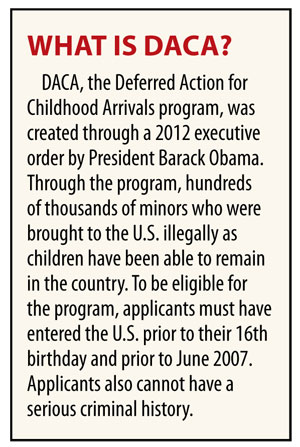On Sept. 5, U.S. Attorney General Jeff Sessions announced that the Trump Administration would be rescinding DACA, the Deferred Action for Childhood Arrivals program. The program, which protects nearly 800,000, is now in the hands of Congress. They have been given a six-month window to act.
In the wake of the announcement, the reaction across the Vancouver education and advocacy community has been one of shock and dismay.
“It has been a fantastic program that has offered security to students and also security to communities,” said Loretta Capeheart, associate vice president of Diversity, Equity and Inclusion at Clark College. “These are our neighbors, they’re the people we go to church with, the people who are in our schools, the people we buy bread from, they’re our community members … There are many of these incredibly bright young people who we’ve invested in greatly as a community around the country, through their education and on into careers, and I think it’s a huge loss for all of us that this program is coming to an end.”
“This is important to our community,” said Diana Nuñez, president of the Hispanic Metropolitan Chamber of Oregon and Southwest Washington. “They’re our future business owners, a lot of our dreamers are still in college or going to go into college. These are our brilliant innovators, entrepreneurs, and our business sector needs them, needs their voices. We want to give them the support that they need to get there.”
Diana Perez, Washington state director of the League of United Latin American Citizens, or LULAC, which just recently opened their first Pacific Northwest Chapter in Vancouver, recalled the initial reaction as: “A shockwave. With this initial shockwave it’s shock, disbelief, anger, uncertainty, instability, fear. All of that bundled up is the immediate reaction, what now?”
“It’s already having an impact (on Clark College), we’ve had students who are very much afraid (of) what it means for them who are needing support and services,” Capeheart said. “There are a lot of community groups coming together to hold what are being called family planning workshops, which basically means trying to figure out what will happen to your children if you’re deported. The older group is into their 30s now, so they have young children. If they are deported what will come of their children?”
Vancouver Public Schools Executive Director Kym Tyelyn-Carlson spoke to the fear they anticipate some students may feel.
“There’s potential for further instability, a student not knowing whether their parents are going to be home or not, what their future might look like or not look like depending on the decisions that are made by the Legislature,” Tyelyn-Carlson said.
Capeheart, Tyelyn-Carlson and Nuñez all referenced LULAC as a source of information for local DACA recipients and immigrants. Recent well-attended community teachings have shed light on the need for clarity and education on a complex issue.
 “We got the Northwest Immigrants Rights Project to come down here – Jorge Barón, the executive director and lawyer, to hold a free Immigration 101 workshop for social service providers,” Perez said. “We were maxed out. We didn’t expect to exceed the capacity of the room for that training, so that tells you the need. From there we went to the Evergreen School District and had the same Immigration 101 workshop for their school counselors and staff. The need to be educated and aware on the complexities of immigration and how to better service the community is still a void and a niche that needs to be addressed.”
“We got the Northwest Immigrants Rights Project to come down here – Jorge Barón, the executive director and lawyer, to hold a free Immigration 101 workshop for social service providers,” Perez said. “We were maxed out. We didn’t expect to exceed the capacity of the room for that training, so that tells you the need. From there we went to the Evergreen School District and had the same Immigration 101 workshop for their school counselors and staff. The need to be educated and aware on the complexities of immigration and how to better service the community is still a void and a niche that needs to be addressed.”
Additional impacts of ending DACA
Beyond impacting DACA program participants, all interviewed saw larger, potentially detrimental implications for the Vancouver community at large.
“I know there are many employers who happily employ DACA recipients,” Capeheart said. “These are almost prescreened employees. The ability to get DACA documents is very limited. You have to have a really clean background and record, and have been in school when you apply and be pursuing a college education. These are sought after employees and students.”
“Searching for people to redo your roof or do work on your landscape or even painting, people are short, they’re not finding the workers they need,” Perez said. “From a competition level their competition has lessened. On the other hand, it’s tougher because you can’t find the workforce to help you pick up all of the demand. I’ve seen the issue for some of our local businesses within the painting and construction area where you need some trade work and it’s hard to find the folks to do that because you’re booked up, so you can’t pick up anymore.”
Speaking to businesses and business owners who work with DACA recipients, Nuñez sees a need for education for these members of the business community as well.
“Not necessarily Latino business owners who may find themselves in a precarious situation or unsure with their documentation, but also for business owners who employ Latino workers and how they protect their workers as well and their families. Also, know your rights as a business owner who is working with the Latino community. They might need your support. They (business owners) have come to us and we have partners that we work with to put on legal clinics that we are recommending our clients to.”
“Thinking about the business community, this means lesser business,” Capeheart said. “These are people with money and jobs who had some security under DACA and are going to lose that. We know that when people lose security they don’t spend money. They may be afraid to go to work. It’s going to have a huge ripple effect all the way from the economic impact of people not being able to work or being able to go out and buy things all the way through to children being afraid and traumatized by the impact of this.”
For some undocumented business owners who had hoped to keep businesses within the family, the cancellation of DACA means alternate arrangements must be considered.
“When President Trump took office, we started seeing some of our undocumented business owners trying to figure out how to pass their businesses onto their kids – their older children and secure their assets and secure their business,” Nuñez said. “Then when it came out that DACA was possibly ending there was a scramble of what do we do now? … We do get those questions because we work with a lot of small businesses that are with our immigrants, documented and undocumented alike, so what are the best ways to create safety nets for those investments that they’ve made, for the property that they may have. Those are questions that we’re still answering day by day, there’s not an immediate fix.”
“We don’t know what to expect out of this administration. All we know is to prepare for the worst,” Perez said.
“In these next five months (we’re) absolutely advocating for our different legislators and senators and Congress people to send the message back that we want our dreamers here,” Nuñez said. “These are amazing students and business owners, they are contributing and we want them here because they are good for our community.”



